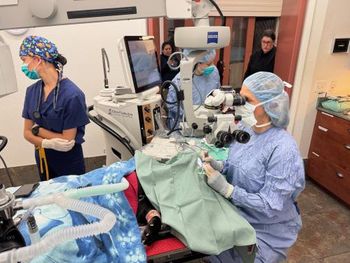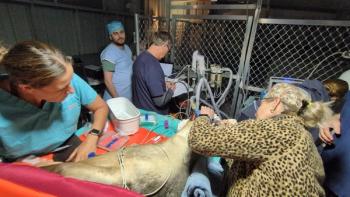
Just Ask the Expert: What's causing this dog's sudden blindness and polyphagia?
Dr. Christopher Byers helps diagnose this dog's condition.
Dr. Byers welcomes critical care questions from veterinarians and veterinary technicians.
Alice, my patient and my own dog, has acutely and progressively gone blind over the past two weeks. She is a 13-year-old spayed female Staffordshire terrier. Her vaccination status is current, she is receiving internal and external parasite preventives, and she has had no exposure to toxins. She has not had any polyuria or polydipsia but has become noticeably polyphagic. She seems disoriented, and some movements are what I would call jerky or sudden. Her gait and the rest of her initial neurologic examination findings were normal. Her complete blood count, serum chemistry profile, and urinalysis results were normal, as were her pupil sizes and pupillary light reflexes. Could she have a tumor on her optic chiasm or another neurologic condition?
A. Alice's clinical signs are interesting and, unfortunately, not very clear-cut. If the primary issue is ultimately a visual deficit with behavioral changes, perhaps the jerky movements are secondary to this deficit. However, these movement abnormalities may certainly be secondary to something more sinister such as a cerebellar lesion or a prosencephalic lesion, and, thus, multifocal disease must be considered.
Dr. Christopher G. Byers
I first recommend a blood pressure measurement and then a complete ophthalmic examination to rule out sudden acquired retinal degeneration syndrome (SARDS), progressive retinal atrophy (PRA), and a hypertensive retinopathy. This examination will also allow evaluation for possible optic neuritis. If no abnormalities are documented on ophthalmic examination, evaluation by a neurologist to follow with advanced imaging (particularly magnetic resonance imaging) and cerebrospinal fluid evaluation are likely needed.
CASE OUTCOME
After testing revealed a normal blood pressure, Alice was evaluated by an ophthalmologist, and SARDS was diagnosed. Female dogs may be more likely to develop SARDS, and, despite normal serum chemistry profile results, all dogs with SARDS should be specifically tested for Cushing's disease. Owners of dogs with SARDS frequently report concurrent onset polyuria and polydipsia.
Clinically, SARDS is characterized by a loss of vision over one to two weeks. The retina appears normal at first but will degenerate over time. SARDS can be detected by chromatic pupillary light activity testing. Dogs with SARDS will have no response to red light and good response to blue light.1 A definitive diagnosis of SARDS should be established by electroretinography.
The cause of SARDS remains undiscovered, but one study says that SARDS may be a paraneoplastic syndrome,2 and there are other reports of some SARDS patients responding to intravenous immunoglobulin G (IVIg), thus raising suspicions for an immune-mediated process.3 Currently, there is no approved treatment for SARDS.
Christopher G. Byers, DVM, DACVECC, DACVIM
VCA Veterinary Referral Associates
500 Perry Parkway
Gaithersburg, MD 20877
REFERENCES
1. Grozdanic SD, Matic M, Sakaguchi DS, et al. Evaluation of retinal status using chromatic pupil light reflex activity in healthy and diseased canine eyes. Invest Ophthalmol Vis Sci 2007;48(11):5178-5183.
2. Gilmour MA, Cardenas MR, Blaik MA, et al. Evaluation of a comparative pathogenesis between cancer-associated retinopathy in humans and sudden acquired retinal degeneration syndrome in dogs via diagnostic imaging and western blot analysis. Am J Vet Res 2006;67(5):877-881.
3. Grozdanic SD, Harper MM, Kecova H. Antibody-mediated retinopathies in canine patients: mechanism, diagnosis, and treatment modalities. Vet Clin North Am Small Anim Pract 2008;38(2):361-387.
Answer provided by Christopher G. Byers, DVM, DACVECC, DACVIM, VCA Referral Associates, Gaithersburg, Md.
Newsletter
From exam room tips to practice management insights, get trusted veterinary news delivered straight to your inbox—subscribe to dvm360.




